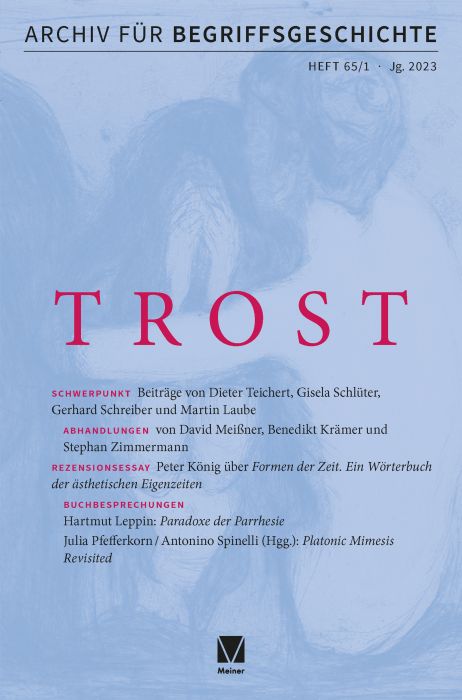Archiv für Begriffsgeschichte. Band 65,1
Schwerpunkt: Trost

Beschreibung
Bibliographische Angaben
| Einband | |
|---|---|
| DOI | |
| Auflage | |
| ISBN | |
| Sprache | |
| Originaltitel | |
| Umfang | 174 Seiten |
| Erscheinungsjahr (Copyright) | 2023 |
| Reihe | Archiv für Begriffsgeschichte |
| Herausgeber/in | Carsten Dutt Hubertus Busche Michael Erler |
| Beiträge von | Carsten Dutt Peter König Benedikt Krämer Martin Laube David Meißner Gisela Schlüter Gerhard Schreiber Dieter Teichert Stephan Zimmermann |
| Hersteller nach GPSR |
Felix Meiner Verlag GmbH |
Service
Einzelartikel als PDF
Trost bei Cicero und Seneca
From the modern perspective, ancient consolatory writings are characterized by a striking absence of empathy and compassion. They primarily address negative emotions such as sorrow and grief. In particular, the Stoics discuss the handling of negative experiences based on nuanced conceptions of emotions. While Cicero considers the traditional consolatory arguments of philosophers to be only partially effective, Seneca unfolds a complex textual strategy in the oldest preserved consolatio, the consolatory writing for Marcia, to alleviate grief. Stoic concepts are employed in a manner tailored to the specific biographical situation of the addressee, activating the imagination to bring about a profound change in attitude. Reflection, imagination, and performance are the essential elements in this process.
16,90 €
Montaigne über Trost
Looking at the fluid textual corpus of the Essais, one can identify several lines of argument concerning consolation. Before delving into his work on the Essais, Montaigne connects to the genre of consolation literature through his famous letter of consolation to his wife, in which he draws entirely on what Plutarch had written to his wife on the same occasion of losing a child. He then critically examines the themes of consolation related to death and pain. Setting aside Christian ideas of an afterlife, he focuses on traditional philosophical approaches to finding solace: Stoic selfimmunization and, on the other hand, skeptical-Epicurean distraction. As Montaigne approaches old age, he rejects Stoicism and its remedies as incompatible with human beings, instead evoking the bittersweet comforts of illusion recommended by Skepticism.
16,90 €
Der Begriff des Trostes bei Søren Kierkegaard
The concept of trøst [consolation, comfort, solace] has not received much attention in the Kierkegaard literature. Apart from isolated remarks, there is neither a treatise nor an entry on it in Kierkegaard handbooks and dictionaries. It is therefore an attractive but complex undertaking to gain an overview of Kierkegaard’s treatment of the concept of trøst by evaluating the relevant passages in Kierkegaard’s extensive oeuvre in order to identify essential characteristics and lines of development. After some brief remarks on the occurrence of this concept in Kierkegaard’s work, general observations are made on Kierkegaard’s concept of trøst as a basis for a thorough historical-systematic approach.
16,90 €
Überlegungen zum Trost bei Hans Blumenberg
Against the widespread tendency to devalue consolation, Hans Blumenberg emphasizes man’s anthropological need for consolation. This need arises from the elementary groundlessness of his existence. Man must learn to bear the unbearability of the "big questions" in order to be able to live "in spite of them". This requires consolation; but, at the same time, this is exactly what consolation provides. For Blumenberg, inconsolability, the need for consolation, and the ability to be consoled are thus closely related. The appropriate means of consolation is rhetoric. It makes it possible to distance oneself from the horror of reality by distorting the view, distracting or delaying it. In this sense, consolation is about "humane" avoidance of reality. However, this should not be confused with a mere escape from reality. Blumenberg aims at enabling a consoled way of dealing with the inconsolability of man. In place of the alternative of illusionary consolation and desolate resignation, he sets an attitude of thoughtfulness, which both recognizes and preserves the elementary need for consolation of man.
16,90 €
Even though there are many excellent studies of Plato’s Cratylus, determining the position of this dialogue within Plato’s oeuvre remains challenging. In this paper, I aim to shed new light on this complex issue by explicating and defending the following claims: Cratylus articulates a conception of the natural correctness of names that (i) shifts our perspective on the use of ti estiquestions in several Socratic dialogues and (ii) shapes the way in which the method of collection and division is applied in certain other dialogues.
16,90 €
Contemporary theology has shown a growing interest in panentheism – a term coined by nineteenth century philosopher K. C. F. Krause. Central to panentheism is the claim that everything / the world is in god (πᾶν ἐν θεῷ). This way to conceive of the god-world-relation is, in fact, no modern invention. It is prominent, for example, in several ancient Greek philosophers – among them Plotinus. The present paper inquires into the panentheistic structure of Plotinus’ philosophy and considers three aspects: 1. the distinctive features of Plotinian panentheism, including the meaning of the notoriously vague preposition ›in‹, 2. the source of Plotinian panentheism, 3. the function of panentheistic diction in Plotinus’ Enneads.
16,90 €
Schleiermachers hermeneutische Umdeutung einer Bemerkung Kants
In his lectures, talks and writings on hermeneutics, Schleiermacher discusses the various aspects and methods of an artful, i. e., scientifically pursued, practice of understanding. He repeatedly expresses the goal of such understanding with a handy formula which takes up a remark in Kant’s Critique of Pure Reason: to «understand the utterance at first just as well and then better than its author.” This formula, which demands an understanding superior to that of the author of an utterance, is programmatic for Schleiermacher’s hermeneutics. However, he subjects Kant’s remark to a decisive reinterpretation. This paper examines the means and outcome of this reinterpretation.
16,90 €
6,90 €
